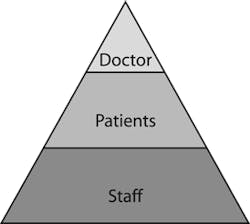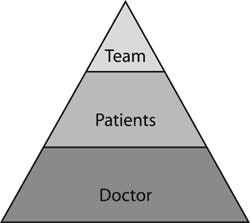The boomerang effect — Part 2
How your beliefs return to create your personal and professional lives
The game of life is a game of boomerangs. Our thoughts, deeds, and words return to to us sooner or later, with astounding accuracy. — Florence Shinn
For more on this topic, go to www.dentaleconomics.com and search using the following key words; beliefs, empowering beliefs, thoughts, actions, practice success.
Florence is absolutely correct. As a dental professional, what you think, do, and say today will automatically return to create your dental practice and life tomorrow. In our new book, The Boomerang Effect for Dental Professionals, we present the 10 beliefs (the most powerful form of thought) and the actions they produce. In our article in the April issue of Dental Economics, we discussed Empowering Belief No. 1 — My Success Is a Choice. In this issue, you will discover Empowering Belief No. 7 — I'm Here To Serve My Team and Patients.
Team comes first; patients come second
A famous singer was scheduled to appear at a Paris opera house. Ticket sales boomed, and the night of the concert found the house full and every ticket sold.
A feeling of anticipation and excitement was in the air as the house manager stepped out on the stage and announced, “Ladies and gentlemen, thank you for your enthusiastic support, but I have news that may be disappointing to some. An accident, not serious in nature but serious enough, will prevent the woman you have come to hear from performing tonight.” He went on to give the name of the understudy who would step into the role, but the crowd groaned and drowned it out. The excitement in the audience turned to bitter disappointment and frustration as the opera began.
The stand-in artist gave the performance everything she had. Throughout the evening, there had been nothing but an uneasy silence. Even at the end, no one applauded.
Then from the balcony, the thin voice of a little boy broke the silence. “Mommy,” he called out, “I think you were wonderful!” The crowd was silent for a second, and then broke into thunderous applause.
In many ways, your dental office is like the opera house. The team members are the understudies, and you are the little boy in the balcony. When you praise your team, after they've given their performances everything they have, they will feel fantastic, do even better the next time, and enjoy walking in the door every day. And if they're happy, there's a really good chance your patients and you are going to be happy.
There are two groups of people who walk into your office each day: your patients and your team. Which one is more important? It's very easy to get totally preoccupied with serving your patients because there's a sense of urgency associated with them. (“We need to take great care of them now because they're here for only a short period of time, and they pay the bills.”) But we believe your team is more important even though there isn't that same sense of urgency associated with them. (“They're here all the time, and they don't pay the bills.”)
A great way to gauge whether you put your team first is to examine your actions after a patient complains about a team member. Do you automatically think, “The patient is right,” and then call the person to apologize for the team member's poor behavior?
Southwest Airlines' legendary CEO, Herb Kelleher, wouldn't do something like that. When asked if the customer is always right, Herb answered, “No, they're not! And I think that's one of the biggest betrayals of employees a boss can possibly commit. The customer is sometimes wrong. We don't carry those sorts of customers. We write them and say, ‘Fly somebody else. Don't abuse our people.'”
Southwest's president, Colleen Barrett, agrees with Herb when she says, “We're in the customer service business. We happen to offer air transportation. We consider our employees to be our number one customers. Our passengers are second, and our shareholders are third. As leaders, if we give great customer service to our employees, they will in turn provide it to their customers who are the passengers. And the rewards will be there for our shareholders.”
Not only is Herb's and Colleen's way “the right thing to do,” how do you think the Southwest Airlines team reacts when they hear Herb and Colleen go to bat for them? They respond with a truckload of loyalty no paycheck will ever buy.
Like Southwest Airlines, when you put your team first and patients second, you will increase the level of service to the patients, not decrease it. When you treat your team with more care and concern, they will treat your patients with more care and concern. Your patients will then accept more comprehensive dentistry. Everybody wins when you put your team first.
Life is a place of service.
Joy can be real only if people look upon their life
as a service and have a definite object in life
outside themselves and their personal happiness.
— Leo Tolstoy
Invert the pyramid
The organizational pyramid for most dental offices looks like Figure A below.
At the top of the pyramid is the doctor. The doctor is the supreme commander of the entire dental operation. Everyone else is beneath, so the doctor has to be looked up to. The patients are the next level down. They are treated by the doctor, who tells them what dental care they need. The lowly staff is on the bottom of the pyramid because it's their job to serve the patients and the doctor.
We believe the pyramid should be inverted as shown in Figure B below. The team should come first and be on top. The clients should come second, and the doctor is at the bottom. The doctor is still the leader, but a servant leader.
Inverting your office pyramid may be one of the most challenging things you will ever do in your professional career, and one of the most vitally important. It will require dropping a massive load of your ego. We used the word “load” in the previous sentence on purpose. It feels heavy being alone at the top. Sure, you're the boss, but that gets old in a hurry. It's tiring constantly telling people what to do, demanding that they do it, and correcting them when they don't.
We know this from our experience. At one time in our careers, both of us arranged our offices according to Figure A. It was an unwritten rule carefully taught to us by society, the training institutions we attended, and other health-care professionals. We got tired of feeling heavy, so we changed. Now, we feel light and take things lightly. Our team, patients, and families feel it. We encourage you to lighten up, too.
Mountains appear more lofty the nearer they are approached, but great leaders resemble them not in this particular.
—Marguerite Blessington
Culture — the invisible framework
Your office's culture is the invisible framework that supports and gives justification to the actions of the entire team. The individual pieces of that framework are values. Values are deep-seated beliefs about the world and how it operates. They are the emotional rules that govern your attitudes and behavior. Values are also the guidelines people use to make decisions. Walt Disney's brother, Roy, summed it up best when he said, “When values are clear, decisions are easy.”
Maintaining a culture and instilling values isn't easy. Organizations have to consistently work at it. One reason Southwest Airlines has been so successful is because of the culture it has created and maintained. Herb Kelleher says, “Culture is the most precious thing a company has, so you must work harder at it than anything else.”
The Walt Disney Company agrees. Every new employee, whether it's a senior vice president or a person sweeping the sidewalks at a Disney theme park, must take a two-day Disney Traditions training program. Through a history lesson on the origins of the Disney tradition and stories of people who have exemplified its values, each person learns what it means to represent The Walt Disney Company. When finished, their actions are purposeful and their decision-making process is clear.
So how do you create an outstanding culture in your dental office? It's deceptively simple. Decide what's important and talk about it over and over. We believe it's important to change people's lives, to give patients five-star service, to offer them the best that dentistry has to offer, to have fun, to earn a great living, and to have lots of time with our families. So we talk about all these things over and over.
Actions that exemplify empowering Belief No. 7:
- Make a copy of the Figure B pyramid. Then put it somewhere you will see it every day you're in the office to remind you to be a servant leader.
- When a patient complains to you about a team member, and it's obvious the patient is in the wrong, support your team member. Then, let the patient know how you feel and make it clear you won't tolerate that kind of behavior in the future. Make sure your team members hear how you support them.
- Use Art's Fire Five Rule. Next week, hold a team meeting and choose five patients to fire. These are the people who everyone dislikes to see on the schedule and whose actions tie your intestines into little knots. Call them and explain why your relationship isn't working out.
- Decide what's important in your office and talk about it over and over.
- Use the words, “How can I help?” repeatedly. These words are magical. They will automatically invert your pyramid. Say them frequently to your team and patients in the form of the following examples.
Team examples
- “Angie, I know you want to be at your daughter's soccer game at 5 p.m. How can I help you get out right at 4:30?”
- “Tammy, our new magazine ad is really generating a lot of phone calls. How can I help you handle them all well?”
- “Snow, how can I help you stay up-to-date on all the new advances in perio therapy?”
Patient examples
- “Lindsey, thanks for coming into our office today. How can I help?”
- “Kelly, I know you want to have those veneers done. How can I help you have them?”
- “Mickey, we've just talked about good dentistry, better dentistry, and the best dentistry you can have. We're here to serve you. What's the best way we can help?”
Conclusion
The walls of Southwest Airlines' corporate headquarters are filled with photos of passengers and team members. The idea was Colleen Barrett's. She wanted to make the sterile corporate walls more homelike. Colleen will retire in 2008. When asked what words she would like on a plaque under her photo after she was gone, Colleen replied, “She cared.”
After you retire, what words will be put on the plaque under your photo on the wall? Will it be “He fixed teeth,” “She made a lot of money,” or “He was the boss”? Or will it be “She cared,” “She was a servant leader,” or “He changed people's lives”? The choices you make from this moment on will determine these words. Choose wisely.
Matt Bynum and Art Mowery are practicing dentists in Simpsonville, S.C., and Gainesville, Fla., respectively, and are featured speakers and clinical instructors at the Las Vegas Institute. They are the authors of the new book, THE BOOMERANG EFFECT for Dental Professionals: How Your Beliefs Return To Create Your Personal and Professional Lives. Several times each year they present their “Achieving Extreme Success Program” at various locations in North America. For books or other product information, go to www.bynummoweryway.com. Contact Dr. Bynum at [email protected] and Dr. Mowery at [email protected].



